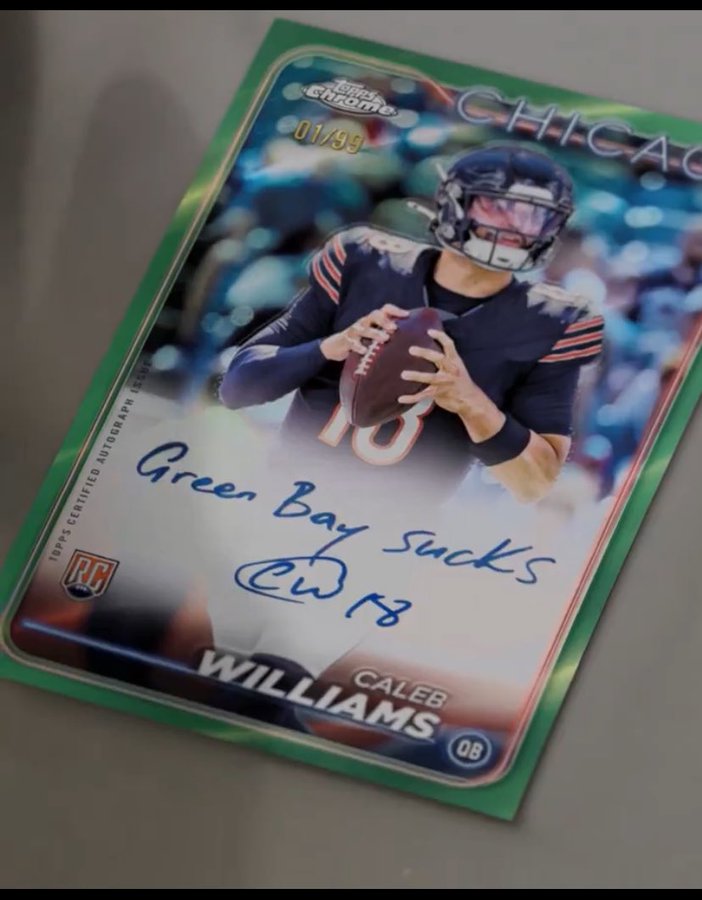Caleb Williams, freshly suited in Chicago Bears colors and still shiny with the eagerness of a rookie quarterback, has kicked dust into the embers of one of football’s longest-running rivalries. With a flourish of a pen and a cheeky grin on his face, Williams has inscribed “Green Bay Sucks” on select autographed cards within the 2024 Topps Chrome Football collection. This bold declaration is ruffling feathers in both the NFL and the sports card collecting community, making waves that are sure to resonate through Lambeau to the Soldier Field bleachers and beyond.
Imagine for a moment the legacy that hangs around the Bears-Packers rivalry like a stubborn wisp of cigar smoke from George Halas’ and Vince Lombardi’s days. This is a matchup marinated in history, seasoned with the talents of Walter Payton and Brett Favre, and now, unexpectedly, garnished with Williams’ brash words. Before the ink had dried, Williams had stamped his presence into this historic rivalry, and he hasn’t even taken a single snap in a regular-season Bears game yet. Talk about making an entrance.
It’s not unusual for athletes to personalize autograph memorabilia with a signature flourish such as motivational mantras or faith-tinged sentiments. Inscriptions can range from the profound to the mundane, yet Williams’ chosen words are opening a whole new chapter. His “Green Bay Sucks” scribble is delighting Bears enthusiasts who prize bold declarations almost as much as victories. On the flip side, it’s likely to stick in the craw of Packers devotees, prompting some to collect the card out of sheer contrarian spirit, or perhaps even to engage in ritualistic destruction—burning effigies of collectible cardboard, anyone?
Here’s where the market becomes intriguingly complex and layered. Bears supporters may dive headfirst into a frenzied buying spree, desperate to land one of these rare autograph cards, elevating it to cult status almost overnight. Such enthusiasm could momentarily inflate the prices—serious Bears memorabilia, infused with rivalry-relish, tends to be gold for collectors. Conversely, Packers faithful, their indignation rivaled only by their sense of humor, might snap up the card as a mockery—power declarations be damned—or simply fling them into the bonfire of rival ridicule. Such fickle consumer behavior could skew demand significantly, at least in the short term.
Long-term valuation, however, will weather the storm of this initial furor and instead hinge on Williams’ career trajectory. Should he flourish into a quarterback worthy of the elite, each completed pass adding glitter to the fiery words he scrawled on those cards, its value could soar as a symbol of his swaggering debut into the NFL ethos. Alternatively, should missteps define his path, the card may become little more than a statement of an over-hyped bravado.
Some may wonder if this ploy wasn’t a savvy marketing move from the world of trading cards itself—always seeking the next viral treasure. It showcases the evolution of trading cards from mere memorabilia to cultural vectors; objects that capture not just an autograph or a statistic, but a defining moment in global sports theater. Much as sneakers have crossed from athletic utility to fashion icons, so too have trading cards emerged as cherished artifacts, instilled with the authenticity of personality and dramatic sport lore.
In an age marked by tweets and influencers, where athletes’ every word can instantaneously ripple across extensive digital landscapes, Williams’ autograph seems nothing short of a defining cultural artifact of our time. This card isn’t just another collectable to be slipped into a plastic sleeve, but rather a chrome-plated shout into the ether, an echo of a rivalry that will eddy and whorl throughout the NFL season and beyond. The spotlight now hovers not just on Williams’ rookie season, but on how his opening gambit in penmanship might shape an ironclad legacy—giving a fresh tint to an age-old contest that stirs the soul of the NFL faithful.
